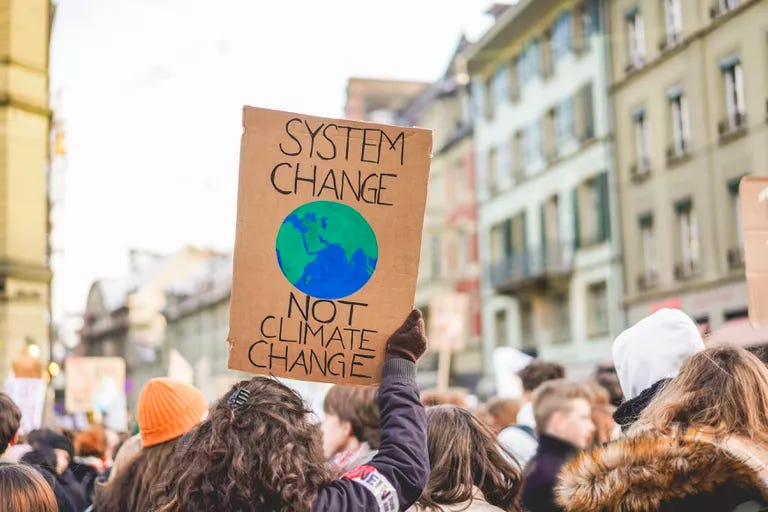The Patriotic Approach to Climate
Part IV: Climate Inequality & Indifference
🤓 Bite-Sized Knurd: Countries around the world have an opportunity to lead the next economic era: the green economy. The IPCC report lays out exactly what governments and corporations can do to mitigate the cliamte crisis.
Read on for more…
Happy almost Earth Day! Last week was a pretty heavy newsletter. So this week we’re going to focus on some hopeful news.
We have everything we need to solve the climate crisis.
We just need more people to get on the climate train. (literally and figuratively, coming from an Amtrak geek).
I’ve always said that the Climate Crisis is an incredible opportunity for any country or business that wants to step to the front of the line and act.
It’s well documented that the cost of mitigating the climate crisis will be less than the cost of doing nothing. The internet even has a fun little budget clock. (hint: it’s in the 10s of trillions).
If we were to look at transitioning to a clean economy in purely selfish, capitalistic terms, it’s still a win-win to spend the money to transition off of fossil fuels and reduce our footprint. (I tend to take the empathetic route where I care about the people, animals, and nature on this planet, but I support whatever’s going to get you on team climate).

The good news is…
We Have the Roadmap
The IPCC report outlined exactly what was needed to halt the devastation that is coming. And it’s all stuff we’ve known about and that the technology is advanced enough to be able to make it happen.
- Stop Greenhouse Gasses from Accelerating More
Carbon emissions need to drop 43 percent by 2030 and 84 percent by mid-century. The problem? Our carbon emissions are still accelerating.
Governments can be instrumental in supporting these efforts with the carrot and stick approach. This approach offers both motivational solutions like increasing solar and wind production and punishing bad behavior like taxing fossil fuel corporations. The only hiccup is the hugely powerful fossil fuel lobby that has a grip on governments across the world.
- Get Off Coal, Oil, & Gas
In retrospect, using energy from dinosaurs extracted from the earth might not have made sense. We need nations to stop burning coal entirely and cut oil and gas use by 60-70%, the report says. (Yes, I said entirely)
This should be an easy one. Solar and wind energy are now cheaper than fossil fuels after costs dropped by 85% since 2010. We just have to dislodge the fossil fuel corporations and oligarchs from their political influence.
When it comes to patriotism, the U.S. has an opportunity to lead in this effort. If we were to invest significantly in wind and solar manufacturing, we can boost our GDP and set ourselves up as the leader of the green economy.
- Sci-Fi Solutions Get Real
The report makes clear that there isn’t one magic bullet that will solve everything. Therefore, we need to do all of the obvious solutions plus more.
Opportunities include carbon capture (burying carbon in the earth or oceans), transforming farming techniques using both old (Native Americans have been farming sustainably since before the US) and new ideas, and even feeding cows seaweed.
- Greenify Cities & Buildings
Green cities across the world have proven that rethinking the way we design cities can lower our carbon footprint and increase well-being and lower depression.
Boston is a prime example of how to build a sustainable city. Recently elected Mayor, Michelle Wu, ran on a progressive platform for a Green New Deal and equitable economic recovery.
Progressive politics continues to be dismissed in our institutions, but if you pay close attention, progressives locally and nationally are leading the way with a hopeful message to transform and lead in the next economic era.
- Accelerate Sustainable Transportation
It’s well documented how bad flying and driving are for the environment. Developing sustainable transportation will be a mix of age-old solutions (there’s a reason the wheel was a huge breakthrough) and new technologies.
While electric cars will help lower our footprint, there is still the issue with cities designed around cars, not people. Scaling up public transportation, cross-country train systems, and improved safety for pedestrians and cyclists should be prioritized along with EVs so that our cities can work for us, increase equity, and support our wellbeing.
- Create a Fairer World
As I wrote, one of the main barriers to large systemic change is wealthy individuals and nations. The rise in inequality around the world and at home is directly related to the climate crisis. If we can improve equity in wealth and political power, more everyday people can help shape change.

Whatcha Gonna Do About It?
To be clear, solving the climate is not an individual activity. But for our institutions to wake up and act, we need individual participation.
We need to hit a tipping point of mass mobilization so that elected leaders and corporate execs get the picture.
- Spread the Word: Most people are not truly aware of the disasters of the climate crisis because they are fed stories through the media without the full context. The more people are aware, the better.
Think Before You Spend: I say this for two reasons:
a) The less we spend on things, the less we will need to trash, and the less that needs to be extracted from the earth
b) Our economic power is greater than we know. Think about your spending choices and if they support companies that are negatively impacting the planet.
- Vote: This one is obvious, but the Midterm elections are coming up in November in the US. Gen Z and Millennials are poised to be the largest voting bloc by 2028. Younger generations care about climate and have a real chance to dramatically influence their local, state, and national elections if we band together and vote. It’s only our and the planet’s future at stake. No biggie. Are you registered to vote?
Next Week: Personal Guide to Living Sustainably
the roots of change media Newsletter
Join the newsletter to receive the latest updates in your inbox.



